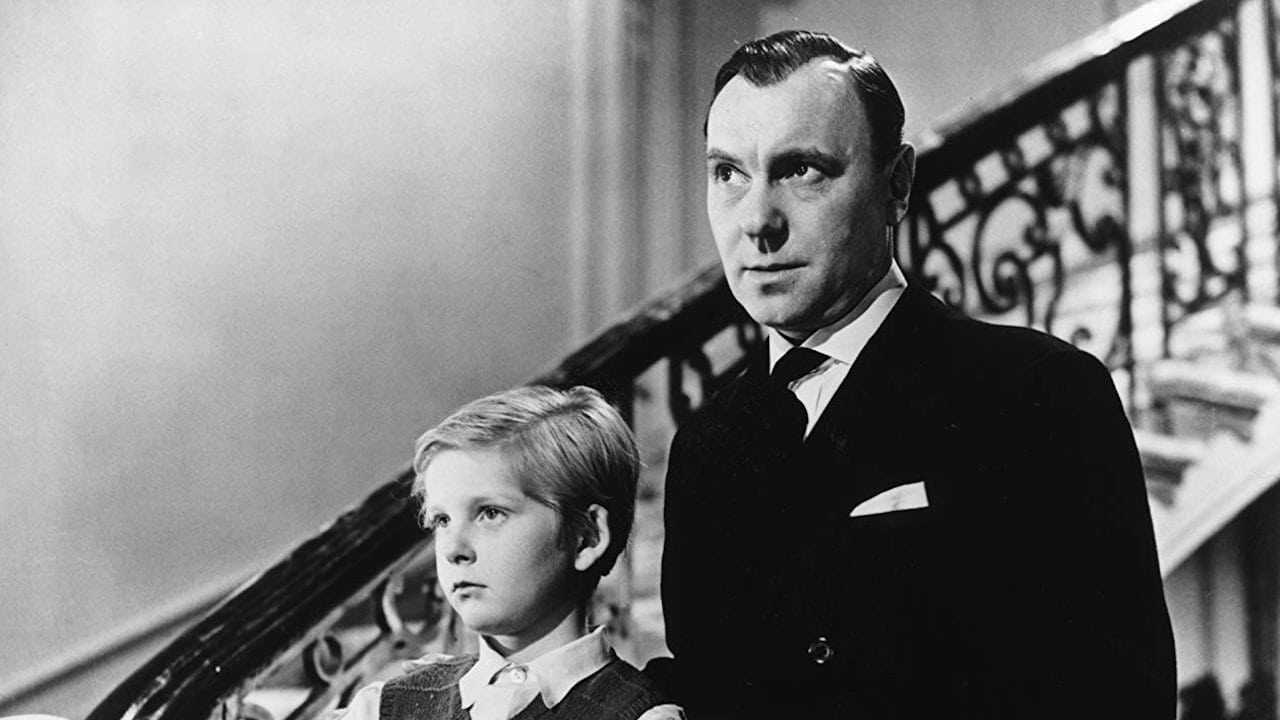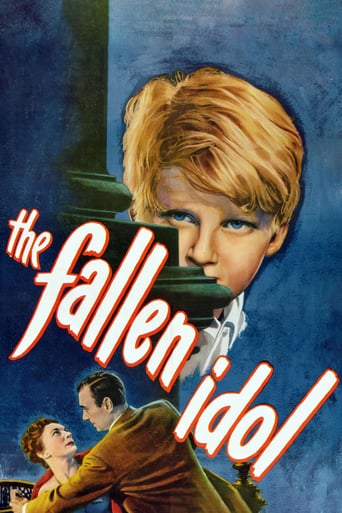

Too much of everything
... View MoreSuch a frustrating disappointment
... View MoreThe movie really just wants to entertain people.
... View MoreThe thing I enjoyed most about the film is the fact that it doesn't shy away from being a super-sized-cliche;
... View MoreThis is an immemorial conundrum for a middle-aged married man in our monogamous society: whereas his wife becomes more and more embittered and insufferable, out of a stroke of luck (or desperation), he finds a possible new lease on life with a younger, beautiful woman, the strategy of bailing out from a dead-end marriage often goes awry when running afoul of a misery-needs- company retaliation from the deserted and begrudged. This is what happens in Carol Reed's THE FALLEN IDOL, adapted by Graham Greene from his short story THE BASEMENT STORY.In London, Mr. Baines (Richardson) is the butler of the ambassador of an unspecified francophone country, whose wife (Dresdel, snarky, fierce and uncompromisingly obnoxious) also works in the embassy, but he is chastely enamored with a younger colleague Julie (Morgan), when the latter gently hands him her ultimatum, Mr. Baines decides to reclaim his freedom, only Ms. Baine is anything but a soft touch, she will fight her corner until her last breath, but is her falling to her death is an accidental windfall for Mr. Baines or his crime of passion? In the eyes of an audience, the whole act is plain as day, but through the lens of our main subject, a young boy Philippe (Henrey), the son of the ambassador who is left alone in the palatial residence, Greene's mordant tale points up a child's innocence getting embroidered with the falsehood of the adult life, and who is the titular "the fallen idol"? It is Mr. Baines, an avuncular father figure to Philippe and entertains him with his tall-tale adventures in Africa, which doesn't necessarily mean it is true. After incidentally discovering Mr. Baines' assignation with Julie, whom he refers to Philippe as his niece (the jumping-off place of a concatenation of lies which would perniciously compound Philippe's inchoate worldview), Philippe is subjected to an untapped territory of keeping secrets, firstly from the idolized Mr. Baines, then from a harpy Ms. Baines, until he has been caught between defending a murderer (at least from his perspective, no one would blame him for his conviction) and grappling with the horrific happenstance, although, the film dramatically blurs the moral line by depicting Ms. Baines as an utterly unpleasant creature (she is the one dispatches Philippe's pet snake, an apt symbol of the reptilian treachery among adults), so much so that no one is supposed to feel sorry for her upshot, a broad stroke emanates a ghost of misogyny albeit conveniently enhancing the credibility of Philippe's dithered reaction. Yet by and large, the film is a cracking allegory taps into a grey area and ushered by a convincingly elicited child performance as our undivided focal point from a young Henrey, who is not exactly an acting prodigy and the end result should be equally attributed to Mr. Reed's patient guidance as well as to this boy's expressive reaction shots. Ralph Richardson, establishing an impermeable veneer of decorousness and presence of mind nonetheless, carefully carries an undertow of cravenly helplessness writs large in the latter part before a rushed revelation saving the day. As for Michèle Morgan, as svelte as an indubitable attention-grabber, her part is thinly written and largely sidelined. Against the grain of an arresting Bildungsroman, THE FALLEN IDOL potently accentuates Reed's directional prowess and his impeccable knack of frame composition and handsome chiaroscuro, the shots of a nocturnal street-scape tellingly anticipates his defining pièce-de-résistance THE THIRD MAN (1949). For all its aesthetic inclination and profound perspicacity, when in the end Philippe exasperatedly hollers that it is him who upset the vase, one feels unable to refrain from thinking that here is a step too far of Reed's indoctrination, a conspiratorial contemplation in silence might have worked better under this circumstance.
... View MoreA young boy is the main character of a film with an Adult Certificate given by the British censors!The impressionable boy keeps the viewer wondering how the story will end.Who is the screenplay writer? The novelist Graham Greene. and Greene never lets you down.Director Sir Carol Reed went on to win honors for another boy centered film two decades later---"Oliver!"
... View MoreThis is the first of three joint ventures that Graham Green and Carol Reed did together. Their second, The Third Man, was released the following year, and I believe THAT to be one of the greatest movies ever made! But, this movie, based on Graham Green's short story, "The Basement Room," was an absolute gem of a thriller on a smaller scale. Whereas The Third Man was set over the entire city of post-war Vienna, this one takes place almost entirely within the main quarters of a French embassy in England. This was my second viewing, and the more I see it the better I LOVE it!! In fact, I consider it to be a small masterpiece!The story revolves around a young boy, Phillipe (Bobby Henrey), the son of an ambassador. Phillipe is left alone with the ambassador's butler, Baines (Ralph Richardson) and his wife (Sonia Dresdel). It is interesting to note that the ambassador leaves at the beginning of the movie and Phillipe's mother is never seen at all until the very end of the movie. Another thing that sort of 'sets the table' for this movie is that Phillipe is not only virtually an orphan, but he also seems to have no friends his age. His world revolves around adults, imaginary friends, and a pet snake. His main friend seems to be the playful Bains, who seems more comfortable entertaining Phillipe than by being the traditional English butler. This is not the case with Mrs Bains. She is a nagging wife to her husband and a strict, almost cruel, governess toward the boy. In short, she is 'a bitch' of the first order.As Phillipe follows Barins to a local tea house, he oversees him in the midst of a tryst with another embassy employee, a young typist, Julie (Michèle Morgan). In front of the boy, Bains and Julie talk in sort of an adult code language, by referring to THEIR problems—of getting free of Mrs. Bains--as 'a friend's problems.' Later, when Bains and the Phillipe are alone, Bains asks the boy to keep his meeting with Julie a secret. Phillipe agrees to their secret as if it were just another of their games together.When Mrs. Bains is killed by falling down the stairs, Phillipe tries to protect Bains from the official suspicion that is growing around him as his wife's killer. But, in truly believing that Bains is the murderer, he becomes confused as to when to keep their secret and when, if, and how he should lie or tell the truth. It is truly baffling as one adult tells him one thing and another adult, another. The boy's dilemmas present us with the framework for the story's thrilling climax.This thriller continually grows as the movie progresses. It's amazing to think that most of the movie takes place in within the embassy's entrance and that the long spiral staircase is such a prominent feature of the movie that it is almost an inanimate 'actor' in the story. Carol Reed manages--through great direction, photography, and editing--to make an ENTIRE WORLD from this one small staging area. The greatest part of the movie is when Bains, Julie, and Phillipe are playing hide-and-go-seek in the embassy entrance hall. As they run though the area waving sheets, turning light switches on and off, and creating child-like mayhem, there is such a fantastic sequence of cinematography that it, alone, should be studied and revered by film students, directors and cinematographers alike. This movie shows Carol Reed's early signature style. It is a worthy successor to Odd Man Out (1947), and more importantly, a worthy predecessor to The Third Man (1949). The techniques are there but just done on a smaller 'stage' with a much smaller scope and cast.
... View MoreFrom the first moments you are a part of Phillipe's world as he peers through the staircase at his idol, Baines, and the hustle and bustle of people on the move. His parents have gone away for a couple of days and he is left in the charge of housekeeper, she-devil Mrs. Baines, who is as malevolent as her husband is kindly. I do love this film but hadn't been prompted to write a review until I read several comments about how "irritating" the little boy, Bobby Henrey appeared. I was so surprised. I didn't think he was annoying at all. Carol Reed may have despaired at having to direct him, apparently he had a very short attention span and in order to maintain his look of wonder Reed would position grips and electricians (people who had befriended the child) just out of camera range to keep him focused. I thought Henrey embodied the age of wonder, where everything was truth and beautiful. In fact his whole personality is what gives the movie the intensity and tension.He is a lonely little boy whose only friends are a little snake, McGregor, which he keeps in a loose brick in the wall and Baines who treats him to winks and funny dances when no one is looking. But Baines (the outstanding Ralph Richardson) has his own dramas, he is in love with Julie (Michelle Morgan), a secretary at the Embassy, and desperately wants to divorce his wife whose jealousy and vindictiveness comes out in her handling of Phillipe. Yes, Phillipe can be tiresome - in the scene where he finds Baines and Julie at a cafe (Baines had been barred, by his wife, from taking Phillipe for a walk) and won't leave them alone, but isn't that what most little kids would be like. I felt a lot of sympathy for the little boy - at a zoo outing he is mostly ignored and ends up dejectedly feeding the birds. He is drawn into the lies that Baines has woven for him, whether it is the "secret" of Baines meeting his "niece", to tall tales of derring do Baines weaves around his pistol.When Mrs. Baines accidentally falls to her death, Phillipe, who saw the struggle at the top of the stairs, then her lying motionless at the bottom (he missed in between that showed it was an accident and Baines wasn't even there) like a true friend, is determined to prove Baines is innocent. It is Phillipe's irritating behaviour that has the film on a knife edge of intensity. Drowning in all the secrets and lies Phillipe decides to lie to the police and as Baines tells the truth (that he and his wife had words because she attacked the boy) Phillip's subterfuge places more and more suspicion on Baines. The Chief of Police uses wheedling methods to trip the little boy up, only Jack Hawkins as the solidly straight forward detective is the movie's breath of fresh air. There seems to be a huge sigh of relief when Phillipe is roughly pushed onto a chair and told to be quiet.Again it is when Phillip is out of the room (being given a lecture by Julie that he has to start telling the truth) that the police see the open window and realise the woman had been trying to get to Julie and slipped over the stairs. For the last five minutes the stress and suspense is now created by the little boy who now wants to tell the truth. "I've got something to tell you", "Please listen", "why won't you hear me" - all said in this thin, piping voice makes for very suspenseful viewing and the very end scene, when his mother (actually Henrey's real mother) calls "Phillipe" you know his life and personality have changed forever.Highly Recommended.
... View More